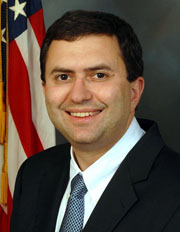When the health law moved from the corridors of Congress last year to state capitals, where officials continue putting it into action, much of the controversy followed it.
Not in Maryland, a Democratic bastion that welcomed the law. Without political baggage to circumnavigate, Maryland is among a handful of states moving quickly to implement the law. Its work may serve as a guide for other states.

“We haven’t had major conflict at this point,” said Dr. Joshua Sharfstein, the state’s health secretary. “There’s broad interest in expanding coverage and reducing costs.”
Earlier this year, the state passed a law to create a health benefit exchange, a keystone of the law that would provide consumers with an online marketplace to shop for coverage. Now, officials are bracing for the next steps ahead of a 2014 deadline for putting much of the overhaul into action.
Today, Maryland Gov. Martin O’Malley appointed nine officials to a board that will be charged with building the exchange. The members include an array of health policy experts, as well as a legal aid official and former business lobbyist. Those appointments are expected to position Maryland to move ahead on that piece of the overhaul.
KHN reporter Christopher Weaver spoke to Sharfstein about Maryland’s plans, challenges, and why he left a prestigious post as second-in-command of the federal Food and Drug Administration to return to state government in January. This is an edited version of that interview.
Maryland has a reputation as a leader in the health overhaul. How are you taking advantage of your head start? What are the next steps?
Our race is to do the right thing for the people of Maryland. I think there is a broad consensus in the state that this law gives us tremendous opportunities for improvements in health. We’ll iron out some of the details of how the exchange will work in the next legislative session. That includes the kind of market the exchange will set up. Will it be the kind of market that sets requirements on insurers, and if so, what should those requirements be?
Maryland has been publicly in lockstep with the federal [government] when it comes to reform. But, given the enormous amount of work the law demands, what challenges does your department expect because of the law?
There are opportunities that are coming — sometimes fast and furious — but they’re opportunities we want to take advantage of. The state of health care absent reform is very challenging. You’re just looking at the cost going up and the coverage going down.
It’s obviously a lean time for state budgets, but what we have are opportunities to get (federal) funding for things that wouldn’t otherwise be funded, and some of those things may actually save money. We see this as a tremendous opportunity, and if it means we have to work harder to take advantage of them, that’s exactly the kind of problem I want to have.
In 2014, 16 million uninsured people will become eligible for Medicaid around the country. How is Maryland bracing for that influx and what lessons can you share with other states?
One of the biggest challenges of health reform is how do you do risk adjustment [the process of estimating how much an individual’s medical care is projected to cost, a key component in pricing insurance coverage]. What are the risks — the actuarial risk — of people who are coming into the system for the first time?
We don’t want to penalize the [health] plans with sicker patients. It’s very important for the plans to be able to gauge the price, because if it’s very uncertain, they’ll price it high. Maybe higher than they need to. Maryland already has a fairly robust risk adjustment system in Medicaid. That may be something we can share with other states.
What was the draw for you to come back to state government from the Obama administration?
It’s a great job. It’s one of the only jobs that combines public health and health care financing. This is really a chance to align the health care system for health. This is an agency that has the reach — it runs Medicaid, finances hospitals, and oversees public health like substance abuse — to be able to think about things differently. It makes the job extremely appealing. This is also a moment in time when there are all these opportunities [as a result of the health law].






